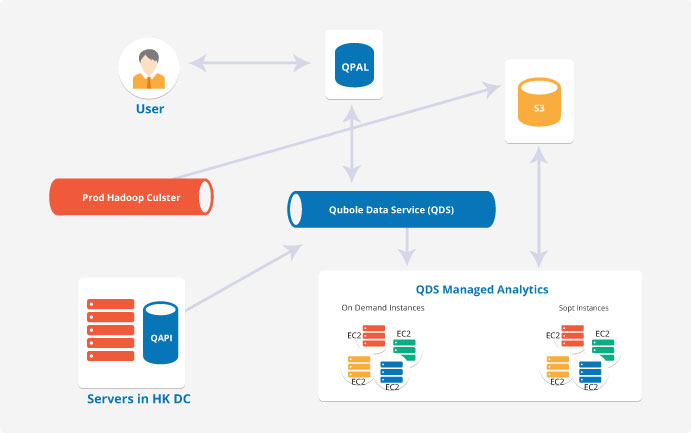Big Data Applications in Gaming
- Home >
- Big Data Analytics
Social Gaming Driven By Big Data
Although gaming is a business built on Big Data, we don’t want to be in the business of Big Data. That’s why we chose Qubole to tackle our Big Data challenges for us. Qubole’s Big Data as a Service solution has addressed our scalability, integration, cluster management issues, and much more.

VP Engineering
Online Games Company
Key Challenges
- High Volume and Velocity
- Mashup Headaches
- Time Consuming Cluster Management
Key Objectives
- Improve playing to paying conversion rates
- Make virtual good offers based on usage patterns and player behavior
- Maximize monetization across player segments
Solution: Gaming
Company Description
A global leader in the mobile and social gaming industry. The company uses Big Data to increase the use and monetization of its games.
Business Goal
Succeeding in the gaming industry isn’t child’s play. The gaming developer needed to understand player behavior to optimize its games so that players stay in their “flow zone” and keep coming back for more. The game company also had to better monetize its games and improve virality factors to attract more players.
Architectural Overview
The gaming company realized from the very start that Hadoop was the best platform for its Big Data requirements to analyze petabytes of granular player interactions and contextual data, both structured and unstructured, every month. Yet, the business had trouble with its internal efforts to realize the full potential of this Big Data platform, running into scalability, usability, and integration issues.
Key Challenges
High Volume and Velocity
Analyzing millions of users, billions of user events, and hundreds of metrics across dozens of titles proved problematic. Jobs would take too long to run or just simply time out. The issue was made worse during crunch time when marketing, product management, and analysts needed immediate insights critical to moving forward with game production decisions. Compute resources couldn’t keep up with peak demand.
Mashup Headaches
Gaming analytics involves a cauldron of data sources to obtain a broad understanding of players and their activities that will help identify the features gamers like, how to expose additional players to the game, and how to get players to keep playing. For example, the gaming company wanted to merge social interaction data with game logs to analyze conversations within a game. Or, to acquire users likely to stay and play, it needed to access US census data such as income and paying status, and player demographics in its CRM system.
Time Consuming Cluster Management
The gaming company began its Hadoop initiative as a proof-of-concept with a single cluster. As it moved into production, the implementation naturally grew in size, leaving the gaming company wanting a more automated approach to configuring, deploying, and managing its Hadoop clusters.

Qubole Data Service (QDS) in Action
High-Performance Auto-Scaling
Using QDS’ fully elastic Hadoop engine, the gaming company no longer hits a wall when processing large jobs or during peak demand. Auto-scaling automatically adds or removes compute resources based on actual usage to meet the Big Data volume and velocity requirements for granular gaming analytics.
Big Data Integration Made Easy
QDS tackled the gaming company’s tough structured and unstructured data mashup challenges using its dozens of pre-built connectors as well as its ability to build custom connectors. No changes to the company’s on-premise infrastructure were required to integrate on-premise, cloud, and social media data sources.
Cluster Management on Auto-Pilot
The game company lets QDS’ automated cluster management take care of all the work to configure, deploy and manage its clusters. Plus, the company now has less downtime due to a reduction in configuration errors and features such as auto-healing to replace failed instances.
Similar Stories

At MediaMath (founded 2007), we’ve built the tools that enable and empower this new breed of marketing professional. Read Case Study

Insightera provides a cutting-edge, real-time inbound marketing platform that accelerates B2B customer acquisition. Read Case Study



